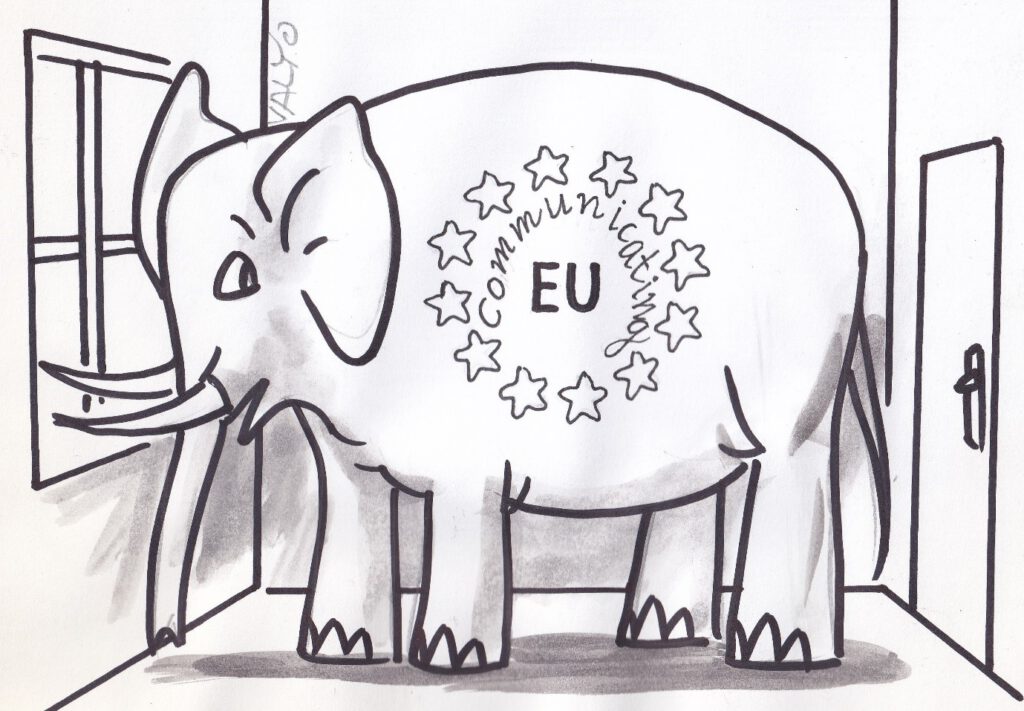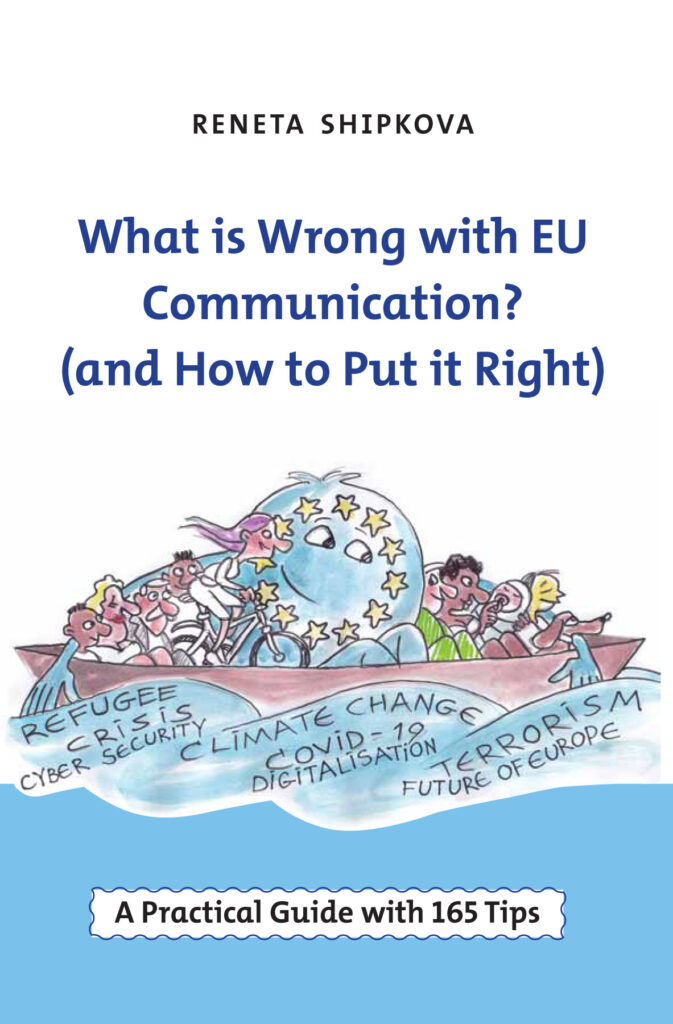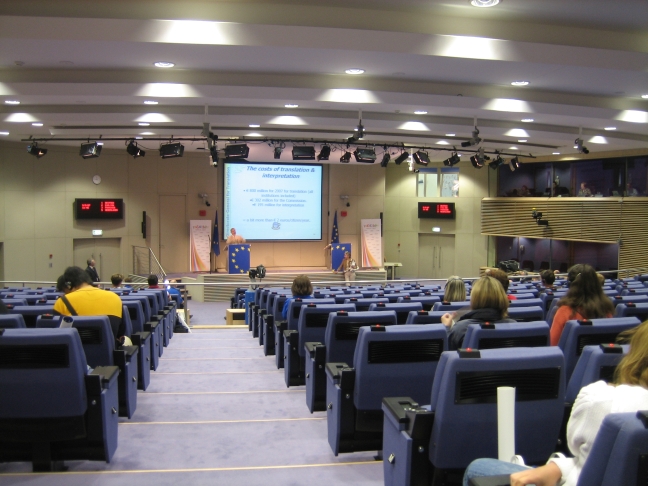The need to communicate political achievements and to communicate them well is a pivotal but overlooked lesson in the EU, Reneta Shipkova argues. Her recent book provides concrete tips to remedy this hiatus.

Politics is communication
The European Union has an age-old problem with the way in which it is perceived. To improve the image of its frontline politicians and institutions it is necessary to improve the quality and impact of their communication because politics is, above all, about communication. This genuine interdependency of rhetoric and politics has been an object of study ever since the most influential thinkers of ancient Greece and Rome: Plato, Socrates, Aristotle, Cicerone, Quintilian etc.
Despite the widespread knowledge of the importance of communication policy in politics, the EU has neglected its communication for decades with the result that the importance of winning hearts and minds has been seriously underestimated. Communication policy has been relegated to an activity of secondary importance.
The EU has failed to engage with people who have little direct interest in or knowledge of European political affairs. It has simply not been able to show so far how it has succeeded in really adding value: to increase well-being, to improve our societies and individuals’ life perspectives. The result is that public confidence in the project has seriously declined and many citizens, journalists and politicians, especially at national level, show little inclination to read and write about or actively discuss – EU matters.
The EU has seriously underestimated the importance of winning hearts and minds. It has failed to engage with people who have little direct interest in or knowledge of European political affairs.
In addition, most of the crises the EU has suffered over the decades– the Danish vote against the Maastricht Treaty in 1992, the fall of the Santer Commission in 1999, the failure of the attempts to establish a Constitution for Europe in France and the Netherlands in 2005, Ireland’s rejection of the Lisbon Treaty in 2009 and most recently the British decision to leave the European Union (Brexit) in 2016 – can be attributed, in no small measure, to ineffective communication.
Due to bad communication, the European Union has been accused of being an elitist project, a politician’s pipe dream, a self-serving entity hopelessly detached from reality.
A lesson not learned
Unfortunately, the current leadership in Brussels still appears to have failed to grasp that no matter its achievements and good intentions, if the EU’s communication fails, the efforts made will simply continue to go unrecognised and most Europeans will remain under the impression that the EU lacks the capacity to respond and deal with local, European or global challenges.
That is why it is fundamental that the EU devotes much greater efforts to bringing the EU closer to the people and the people closer to the EU. If there is not, at least, a radical paradigm shift – if not a communication revolution – then the bare minimum entails a drastic repair to the existing mode of communication.

My book What is Wrong with EU Communication? (and How to Put it Right) sets out to provide new ways of looking at the Union’s Achilles heel.
It examines what exactly is wrong with the European Union’s elites’ and institutions’ style of communication, why their attempts to communicate the advantages and benefits of its policies have so often fallen on deaf ears and delivers practical suggestions, that have the potential to ‘put it right’. For example, it provides guidance in fostering an emotional attachment to the EU project, recommendations for communicating EU via sport, culture and education among the list of all 165 tips that have been generated as to how best to stimulate vibrant public interest and debate around EU affairs.
I hope to have offered some new insights into how to break the vicious circle of political non-communication in which citizens, journalists and national politicians remain reluctant to debate EU matters.
Time for a different communication plan
By way of conclusion, the communication deficit phenomenon is a determining factor in the decrease in levels of trust and support for the EU on the part of European citizens. This is the reason why restoring confidence and re-gaining trust in the EU requires, above all, a new and unconventional exit strategy for communication. If the political establishment in ‘Brussels’is to avoid further alienating the citizens, it needs to stop deliberately ignoring and start talking openly about ‘the elephant in the room’.
The EU decision-makers, both in Brussels and in the national capitals, should be able to make a convincing case for EU’s accomplishments, its worth, its raison d’être and for all the good it does internally and on the world’s stage, as well. This means that the EU should revisit and reinforce its communication capacity by replacing the outdated, reactive and indecisive mode of response with a new, innovative, timely, proactive, confident, and trust-building style of communicating.
EU communication strategy in today’s unpredictable geopolitical context – an environment with multiple challenges, such as the most recent Covid-19 pandemic, terrorist attacks, violent radicalisation, Brexit, refugees’ influx, climate change, cyber threats, etc. – not to mention rising Euroscepticism and xenophobic attitudes – requires a substantial dose of political imagination.
No more of the outdated, reactive and indecisive mode of response. Time for a new, innovative, timely, proactive, confident, and trust-building style of communicating.
EU political communication has the potential to improve the image of the EU, to ‘fix’ the relationship with citizens. It is high time that the supranational EU institutions and particularly national actors took the communication deficit seriously, included it up in their list of priorities and started tackling it in a creative manner.
What is required is a clear action plan that will enable the EU to promote the real benefits and advantages of membership alongside the creation of a European public sphere in which citizens feel that their voice can be heard, their concerns addressed and their aspirations met.
I hope my book is a useful contribution to this end.

Dr Reneta Shipkova obtained her PhD in Political Science from the Vrije Universiteit Brussel (VUB). She is the author of What Accounts for the Communication Deficit of the EU: An Exploration into the Challenges of Communicating Europe. In addition to working as a journalist, an elected town councillor, migration consultant and marketing and PR manager, she has held advisory positions to three Members of the European Parliament over the last twelve years.
Her latest book What is Wrong with EU Communication? (and How to Put it Right) can be purchased here.


